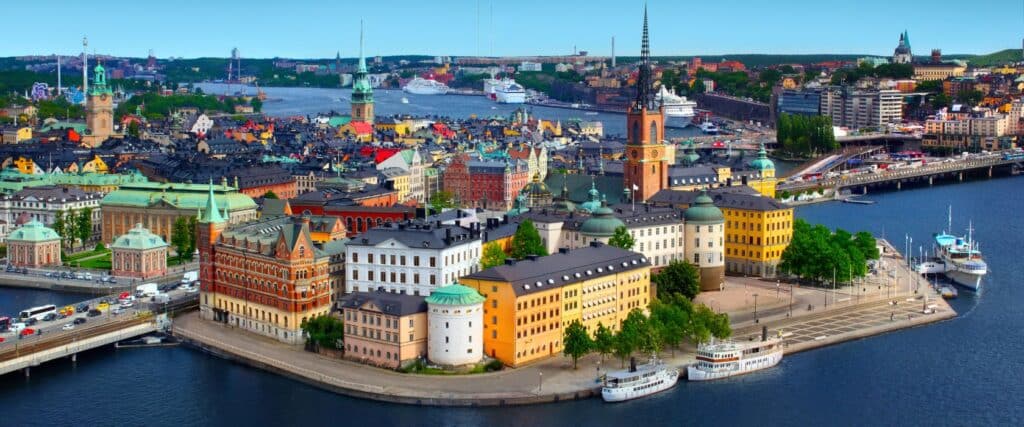Why the Netherlands Is a Top Destination for International Students
For many people, when they think of the Netherlands, they think of winding canals, old windmills, and fields full of tulips. While those things are part of the Netherlands, there is a lot more to it.
The Netherlands is a relatively small country located in Western Europe. Despite its smaller size, it has one of the world’s highest GDPs, ranking in the top 20 highest GDPs in the world.
English-taught programs, high quality of life, and excellent work-life balance are just a few perks. Let’s explore some more reasons why a master’s in the Netherlands is a solid choice.
Why Study in the Netherlands?
English-Taught Master’s Programs
Despite Dutch and Frisian being the official languages, the Netherlands is one of the most English-proficient countries in Europe and worldwide. Around 90% of Dutch people speak English at a sufficient level. As an international student, it is easy to get around even if you don’t speak the language (yet). If you are planning on living in the Netherlands after graduation, it is worth it to learn the language.
Great Work-Life Balance & High Salaries
The Netherlands scores high for quality of life and work-life balance on the OECD Better Life Index. On average, Dutch people gave a score of 7.5 for ‘satisfaction with life’. This is higher than the OECD average of 6.7.
The Netherlands is also one of the highest-paid countries in the world. Dutch workspaces have flat hierarchies and an informal and egalitarian approach. This makes it a great place to live, study, and work.
A Safe Country For Studying Abroad
The Netherlands is also one of the safest countries. It ranks #18 globally in the Global Peace Index (GPI) 2024. Larger cities like Amsterdam or Rotterdam may be somewhat less safe, as there can be pickpockets in tourist-dense areas.
In addition to these reasons, the Netherlands stands out for its world-class universities and strong research opportunities. Let’s further explore the top universities for a master’s degree in the Netherlands.
What Are the Top 5 Universities for a Master’s Degree in the Netherlands?
1. Delft University of Technology
Times Higher Education Ranking: #1 in the Netherlands & #56 in the World University Rank 2025
QS World University Rankings 2025: #49 globally
Delft University of Technology (TU Delft) is the largest and oldest technical university in the Netherlands. In the 2024-2025 academic year, just over a quarter (26.3%) of the students were international students. This makes it a great place to study and make new friends from all over the world.
2. University of Amsterdam
Times Higher Education Ranking: #2 in the Netherlands & #58 in the World University Rank 2025
QS World University Rankings 2025: #55 globally
The University of Amsterdam (UvA) was founded in 1632. In 1877, it was renamed the University of Amsterdam and granted the status of a university. The UvA continued to expand over the years and today includes 34,000 students, 3,000 PhD researchers, and 6,000 staff from across the globe.
3. Wageningen University & Research
Times Higher Education Ranking: #3 in the Netherlands & #67 in the World University Rank 2025
QS World University Rankings 2025: #155 globally
Wageningen University & Research (WUR) focuses on research, particularly in the fields of natural and social sciences. The core areas of research focus on Climate Change, Biodiversity, Feeding the World, Circular Economy, Healthy Food & Living, and AI. Wageningen is known for its lush greenery, reflected in the WUR green campus.
4. Leiden University
Times Higher Education Ranking: #4 in the Netherlands & #73 in the World University Rank 2025
QS World University Rankings 2025: #141 globally
Leiden University was founded in 1575 and has a rich history of tradition. The university includes campuses in both Leiden and the Hague. The university’s research centers on: Fundamentals of Science, Life Sciences, Health and Well-being, Law, Politics and Administration, Languages Cultures, Arts and Societies, and AI.
5. University of Groningen
Times Higher Education Ranking: #5 in the Netherlands & #80 in the World University Rank 2025
QS World University Rankings 2025: #159 globally
Located in the North of the Netherlands, the University of Groningen is an international university with a focus on science and technology. Founded in 1614, the university’s research focuses on Energy and Climate, Public Health, Sustainable Development, and Digitization and AI. The university has produced several Nobel Prize winners, as well as the first Dutch astronaut.
Other high-ranking and notable universities in the Netherlands include Utrecht University, Erasmus University Rotterdam, Vrije Universiteit Amsterdam, Maastricht University, Radboud University, University of Twente, Eindhoven University of Technology, and Tilburg University.
Tuition Fees When Studying in the Netherlands
In the Netherlands, EU/EEA students pay the same tuition fees as Dutch students. For the 2024-2025 academic year, tuition costs are €2,530 (per academic year) for master’s degrees. These statutory tuition fees are set by the Dutch government and are consistent across most schools.
For non-EU/EEA students, the costs for a master’s degree in the Netherlands can cost around €20,000 a year. International student fees can differ per program, school, and duration of study. Some schools also ask international students for an additional application fee.
Typically, master’s degrees in the Netherlands range from 1-2 years. Universities of applied sciences or technical universities are generally cheaper than research-focused universities.
Cost of Living in the Netherlands
Student Housing in the Netherlands
Housing in the Netherlands is limited. Apply for housing well in advance of your studies. Be careful of scammers when searching for housing.
The most expensive city in the Netherlands is Amsterdam. You can expect to pay between €1,500 and €2,300 per month for rent for a single apartment. Student cities like Utrecht also have a competitive housing market. Single apartments can cost around €1,200 to €1,800 per month.
Rotterdam and the Hague are somewhat cheaper cities in the Randstad. Rent is more affordable in smaller towns.
Sites like Kamernet, Pararius, or Housing Anywhere are useful for finding accommodation. Check sites like SSH for student housing. Be quick to react to available rooms and apply early for best results.
Health Insurance
If you are studying in the Netherlands but not working, health insurance from your home country will suffice.
However, if you are working next to your studies, it is mandatory to take out Dutch healthcare. Basic health insurance for students can cost around €130 per month. Some policies can cost between €150-170 per month. You can compare healthcare insurance policies on Zorgwijzer. Costs can differ depending on your provider and if you select extra services for dental care, physiotherapy, etc.
Transportation
In the Netherlands, you can use an OV-chipkaart to get around via public transportation. It can be worth it to invest in a discount OV-chipkaart to travel during “off-peak” hours at a cheaper price.
Many people prefer to use their bikes as their main mode of transportation. Many people sell their bikes on Facebook or Marktplaats. And most importantly, invest in a sturdy lock as bikes are often stolen in the Netherlands.
Scholarships & Financial Aid
Many universities in the Netherlands offer scholarships. These can be checked via the official university websites. Erasmus+ also offers support to international students studying abroad. There are also Dutch government-funded scholarships, such as the NL (Holland) Scholarship.
You can learn more about scholarships through online resources.
Application Process & Admission Requirements
You can apply to universities digitally via Studielink. Always check the entry requirements of your program and school of choice. In the Netherlands, many universities will ask for a previous diploma from a recognized university.
If it is an English-taught program, and your previous study program was not, you may need to do an English-language test. Universities can ask for other paperwork such as a motivation letter or grade transcripts. Ensure you begin your application on time to meet deadlines.
Student Visa & Work Opportunities
EU/EEA students do not need a student residence permit to study in the Netherlands. However, they do need to register at their local municipality and receive a BSN number. International students will need to apply for a student residence permit.
After graduation, graduates can apply for a residence permit for one year (known as an Orientation Year) while searching for employment or starting a business.
Student Life in the Netherlands
Student life in the Netherlands is full of opportunities. There are plenty of on-campus events, sports clubs, and extracurriculars to choose from. The Netherlands has many student societies as well.
King’s Day and Sinterklaas are examples of traditional Dutch holidays. From embracing cycling to eating traditional foods like stampot, stroopwafel, and herring, there are lots of ways to engage in local Dutch culture.
While the grey and rainy winters can be challenging for international students, Dutch summers make up for it. In the summer, the Netherlands comes alive with sunny terraces and (student) festivals. Whether indoors or outdoors, there is never a lack of activities throughout the Dutch academic year.
Ready to Start Your Master’s Journey in the Netherlands?
Are you ready for your gezellig Dutch adventure? With world-renowned universities, a vibrant international community, and a high quality of life, the Netherlands is the perfect place for your master’s adventure.
Don’t just stick to Amsterdam; explore other student-friendly cities like Leiden, Groningen, or Eindhoven. Your next academic chapter awaits!
Get real insight into studying for a master’s in the Netherlands.






